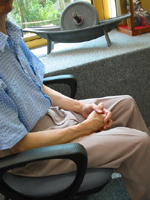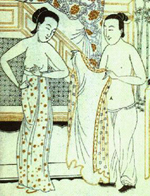Understanding Impotence from a TCM Perspective
 |
| It has been estimated that up to 40 million men in the US and about half of all men aged 40 to 70 years experience erectile dysfunction to some degree. |
Impotence refers to softness of the penis during erection, an inability to maintain an erection or a powerless erection during sex. In Western medicine, these problems are generally categorized under the heading of erectile dysfunction.
In ancient times, the Chinese referred to the male external genitalia as yin apparatus or "yin qi" (The qi mentioned here is different from the qi that normally circulates throughout the body.) Male genitalia are considered to be an assembly of or master of the tendons, which means they are a collection place for the tendons to gather. There are a lot of references for the term "impotence" in Traditional Chinese medicine (TCM), especially in some classic texts. For example, the Huang Di Nei Jing (The Yellow Emperor's Medicine Classic) refers to impotence as the "looseness and unrestraint of the 'master' of tendons (male genitalia)", a "disease of yin qi" and "a dysfunction in the rise and disuse of male genitalia." It was not until 1640 AD, when Zhang Jiebin established a special section in his book Jingyue Quanshu (The Complete Work of Zhang Jiebin) describing impotence as "yang wei" (withered yang), that this term was widely adopted as a formal name in TCM.
In TCM sexual physiology, the kidneys rule reproduction. Essence (jing) stored in the kidneys provides the material basis for genital development and maturation of sexual instinct. Therefore, abundance or depletion of kidney essence (jing) affects sexual function directly. While our sexual energy is derived mainly from inherited kidney essence, it is supplemented by the acquired essence obtained from ingested foods and fluids that have been processed by the spleen and stomach.
 |
| TCM discourages excessive sexual activities because seminal fluid is considered to be a precious life substance. |
According to ancient Chinese texts, sex pertains to a female giving yin and receiving yang, and a male giving yang and receiving yin. In principle, it is an equal and harmonious libido exchange with equal benefit for both partners. Under normal conditions, our blood and qi essence (derived form the kidneys) circulate throughout the body to provide nourishment. During coitus, they gather in the genital area to support sexual functions. Excessive sexual activity will deplete qi essence and blood in men. The material part of qi essence in the kidneys makes up the semen that will be excreted from the body. One reason why TCM discourages excessive sexual activities is because seminal fluid is considered to be a precious qi essence or life substance. Qi essence is one of the fundamental materials used for supporting life activities and exhaustion of it will lead to health problems and possibly even endanger life.
Click here to understand the physiological functions of the kidney essence (jing).
|